unit 2全单元资料
人教英语必修三Unit2全单元教案.doc
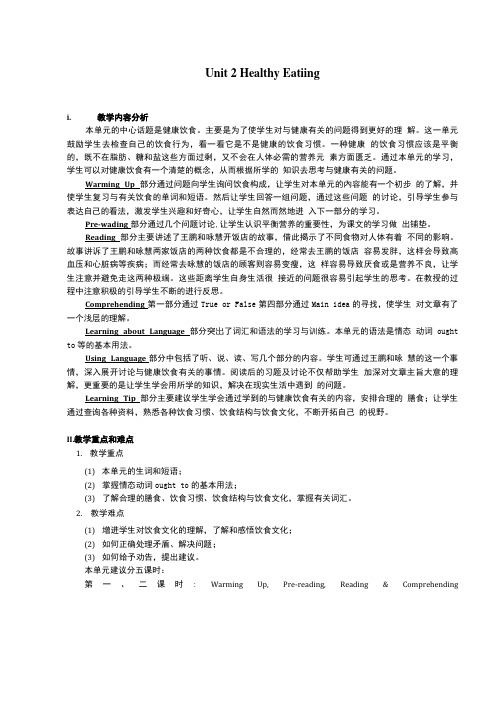
Unit 2 Healthy Eatiingi.教学内容分析本单元的中心话题是健康饮食。
主要是为了使学生对与健康有关的问题得到更好的理解。
这一单元鼓励学生去检查自己的饮食行为,看一看它是不是健康的饮食习惯。
一种健康的饮食习惯应该是平衡的,既不在脂肪、糖和盐这些方面过剩,又不会在人体必需的营养元素方面匮乏。
通过本单元的学习,学生可以对健康饮食有一个清楚的概念,从而根据所学的知识去思考与健康有关的问题。
Warming Up部分通过问题向学生询问饮食构成,让学生对本单元的內容能有一个初步的了解,并使学生复习与有关饮食的单词和短语。
然后让学生回答一组问题,通过这些问题的讨论,引导学生参与表达自己的看法,激发学生兴趣和好奇心,让学生自然而然地进入下一部分的学习。
Pre-wading部分通过几个问题讨论,让学生认识平衡营养的重要性,为课文的学习做出铺垫。
Reading部分主要讲述了王鹏和咏慧开饭店的故事,借此揭示了不同食物对人体有着不同的影响。
故事讲诉了王鹏和咏慧两家饭店的两种饮食都是不合理的,经常去王鹏的饭店容易发胖,这样会导致高血压和心脏病等疾病;而经常去咏慧的饭店的顾客则容易变瘦,这样容易导致厌食或是营养不良,让学生注意并避免走这两种极端。
这些距离学生自身生活很接近的问题很容易引起学生的思考。
在教授的过程中注意积极的引导学生不断的进行反思。
Comprehending第一部分通过True or False第四部分通过Main idea的寻找,使学生对文章有了一个浅层的理解。
Learning about Language部分突岀了词汇和语法的学习与训练。
本单元的语法是情态动词ought to等的基本用法。
Using Language部分中包括了听、说、读、写几个部分的内容。
学生可通过王鹏和咏慧的这一个事情,深入展开讨论与健康饮食有关的事情。
阅读后的习题及讨论不仅帮助学生加深对文章主旨大意的理解,更重要的是让学生学会用所学的知识,解决在现实生活中遇到的问题。
资料《Unit2课文原文与翻译(素材)译林版九年级英语下册》

译林版九年级下册英语课文及翻译UNIT 2英中对照版UNIT2Comic strip1. Who do you think is the greatest person in history,Eddie?埃迪,你认为史上最伟大的人是谁?2. I think it’s Paul Yum.我认为是保罗•亚姆。
3. Paul Yum? I’ve never heard of him.Who’s he?保罗•亚姆?我从没听说过他。
他是谁?4. He’s an inventor.He invented my favourite food.他是一位发明家。
他发明了我最喜爱的食物。
九下· p21-23ReadingThe first man to walk on the MoonNeil Armstrong(1930 – 2012)was the first man to walk on the Moon. Simon is now reading an article about the astronaut and his space travel. Here is the article.尼尔。
阿姆斯特朗(1930-2012)是首位漫步月球的人。
西蒙现在正在阅读一篇关于这位宇航员和他的太空旅行的文章。
这是那篇文章。
NEIL ARMSTRONG尼尔•阿姆斯特朗Neil Armstrong was born on 5 August 1930 in Ohio,the USA. He became interestedin flying when he took his first flight at the age of six, He received his student pilot’s licence when he was 16.尼尔•阿姆斯特朗于1930年8月5日出生于美国俄亥俄州。
在他6岁参加第一次飞行时,他就开始对飞行感兴趣。
Unit 2 Travelling Around-2023高考英语一轮总复习单元知识梳理与测试
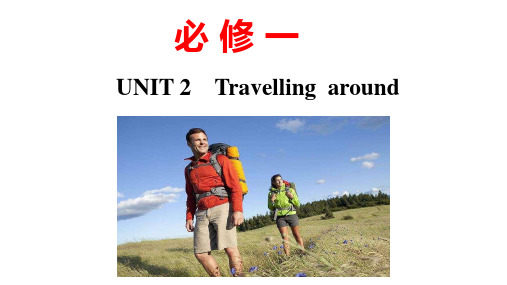
thirds of the total population of the province. 4.The moment the policemen arrived, they_t_o_o_k_c_o_n_t_r_o_l _ofthe
18. credit n.借款;信用;称赞;学分 19. detail n.细节;详情;细微之处
20. request n.(正式或礼貌的)要求;请求vt.(正式或 礼貌地)要求;请求 21. view n.视野;景色;看法
22. sight n.景象;视野;视力
23. statue n.雕塑;雕像 24. comment n.议论;评论vi.& vt.发表意见;评论
during the course because my home is far from school. 3.English is the __o_ff_i_ci_a_l_ (office) language of more than 70 countries
including Britain and Australia. 4 . As is known to us, Chinese women volleyball team is
你“出名”吗? ①be famous for 因……而出名 ②be famous as 作为……而出名 ③be known for 因……而出名 ④be known as 作为……而出名 ⑤be distinguished as/distinguish oneself as
精通版六年级上册小学英语 Unit 2 单元知识点小结
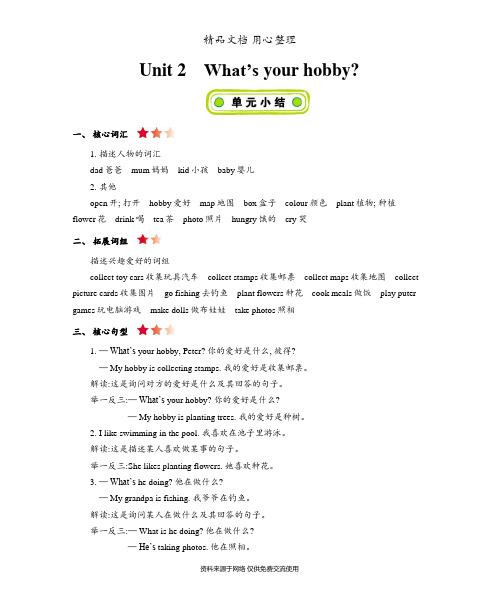
Unit 2What’s your hobby?一、核心词汇1. 描述人物的词汇dad爸爸mum妈妈kid小孩baby婴儿2. 其他open开; 打开hobby爱好map地图box盒子colour颜色plant植物; 种植flower花drink喝tea茶photo照片hungry饿的cry哭二、拓展词组描述兴趣爱好的词组collect toy cars收集玩具汽车collect stamps收集邮票collect maps收集地图collect picture cards收集图片go fishing去钓鱼plant flowers种花cook meals做饭play puter games玩电脑游戏make dolls做布娃娃take photos照相三、核心句型1. —What’s your hobby, Peter? 你的爱好是什么, 彼得?— My hobby is collecting stamps. 我的爱好是收集邮票。
解读:这是询问对方的爱好是什么及其回答的句子。
举一反三:—What’s your hobby? 你的爱好是什么?— My hobby is planting trees. 我的爱好是种树。
2. I like swimming in the pool. 我喜欢在池子里游泳。
解读:这是描述某人喜欢做某事的句子。
举一反三:She likes planting flowers. 她喜欢种花。
3. —What’s he doing? 他在做什么?— My grandpa is fishing. 我爷爷在钓鱼。
解读:这是询问某人在做什么及其回答的句子。
举一反三:— What is he doing? 他在做什么?—He’s taking photos. 他在照相。
4. —What’s your dad’s hobby? 你爸爸的爱好是什么?— His hobby is planting flowers. 他的爱好是种花。
沪教版七下Unit_2_讲义加练习

沪教版七(下)Unit 2 Travelling around the world 一.重要短语1.(be)famous for 以……而著名2.department store 百货商店3.prefer to do更喜欢做某事4.go on holiday 去度假5.go sightseeing 去观光6.western Europe 西欧7.the capital of …的省城8.place of interest 名胜古迹(复数)9.such as 比如10.b e famous for 因为…而著名well-known 11.i n the center of 在…中心12.o n the coast 在海岸线上,在海岸13.d epartment store 百货商场14.p refer to do 更喜欢做某事15.t ry doing 尝试做某事(try to do)16.b e close to 接近于17.b e different from 不同于18.b e far away from 远离…19.m ake grape vine酿造葡萄酒二、课文语言点1、Travelling around the world(1)aroundprep:“围绕;在……围”Eg:The earth goes around the sun 地球围绕太阳转adv :“大约,到处”Eg:The bag is around three kilos 这个包大约有三公斤2、The French flag 法国国旗(1)Frenchadj:法国的,法国人的,法语的Eg:Do you like French dishes?你喜欢法国菜吗?n:法语/法国人Eg:The villagers spoke French 村民们讲法语On my way home,I met a Frenchman 在回家的路上,我遇到了一个法国人3、Don' be silly 别说傻话(1)Silly adj:糊涂的,没头脑的Eg:Oh,how silly you all are! 哦,你们都那么傻常用句式:be silly to do sth = it's silly of sb to do sth 做某事是愚蠢的Eg:You are silly to spend so much money on clothes= It's silly of you to spend so much money on clothes 你花那么多买衣服,真是愚蠢4.western adj. “西面的,西部的”west n.西Western “欧美的,西的” eg. the Western countries 西Western culture 西文化eg. My house is in the western part of the town.[拓展] 词根-ern表示位。
七年级下册英语第2单元课文
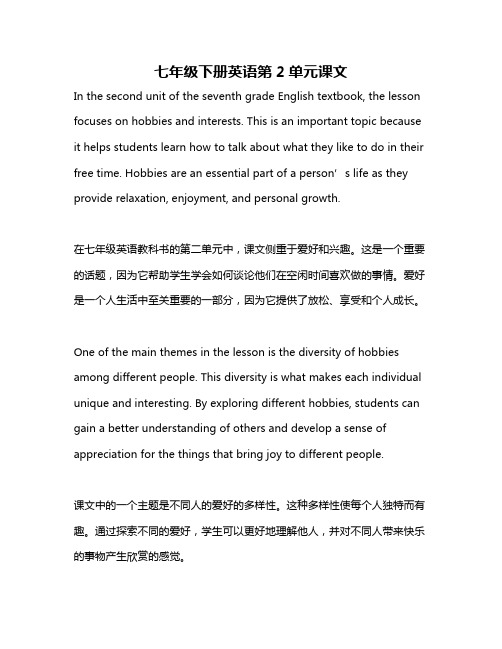
七年级下册英语第2单元课文In the second unit of the seventh grade English textbook, the lesson focuses on hobbies and interests. This is an important topic because it helps students learn how to talk about what they like to do in their free time. Hobbies are an essential part of a person’s life as they provide relaxation, enjoyment, and personal growth.在七年级英语教科书的第二单元中,课文侧重于爱好和兴趣。
这是一个重要的话题,因为它帮助学生学会如何谈论他们在空闲时间喜欢做的事情。
爱好是一个人生活中至关重要的一部分,因为它提供了放松、享受和个人成长。
One of the main themes in the lesson is the diversity of hobbies among different people. This diversity is what makes each individual unique and interesting. By exploring different hobbies, students can gain a better understanding of others and develop a sense of appreciation for the things that bring joy to different people.课文中的一个主题是不同人的爱好的多样性。
这种多样性使每个人独特而有趣。
通过探索不同的爱好,学生可以更好地理解他人,并对不同人带来快乐的事物产生欣赏的感觉。
人教七年级下册英语unit2知识点总结
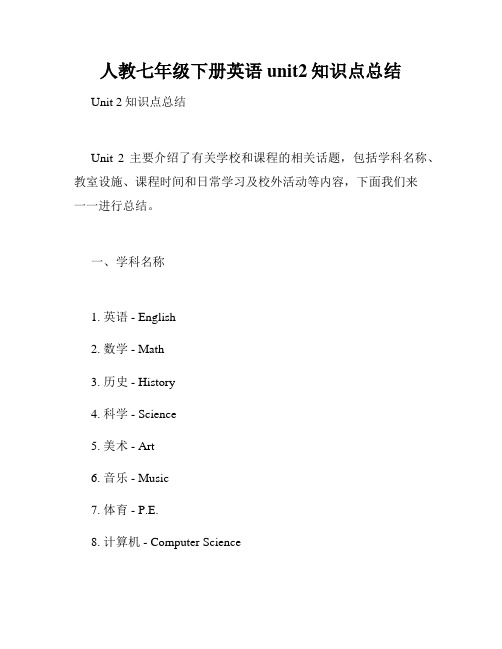
人教七年级下册英语unit2知识点总结Unit 2知识点总结Unit 2主要介绍了有关学校和课程的相关话题,包括学科名称、教室设施、课程时间和日常学习及校外活动等内容,下面我们来一一进行总结。
一、学科名称1. 英语 - English2. 数学 - Math3. 历史 - History4. 科学 - Science5. 美术 - Art6. 音乐 - Music7. 体育 - P.E.8. 计算机 - Computer Science二、教室设施1. 黑板 - blackboard2. 白板 - whiteboard3. 投影仪 - projector4. 音响 - sound system5. 地图 - map6. 水龙头 - tap7. 电视 - TV8. 电脑 - computer9. 灯 - light10. 窗户 - window三、课程时间1. 上午 - in the morning2. 下午 - in the afternoon3. 晚上 - in the evening4. 早上 - in the early morning5. 夜晚 - at night6. 每周 - every week7. 每天 - every day8. 周末 - on weekends四、日常学习1. 做作业 - do homework2. 练习 - practice3. 复习 - review4. 读书 - read books5. 写作 - write compositions6. 讨论 - have discussions7. 板书笔记 - take notes8. 教师讲解 - teacher's explanation9. 学习笔记 - study notes10. 做练习 - do exercises五、校外活动1. 课外活动 - extracurricular activities2. 运动会 - sports meeting3. 聚会 - party4. 社交活动 - social activities5. 英语角 - English corner6. 爱好小组 - hobby group7. 社团活动 - club activities8. 学校之旅 - school trip以上就是Unit 2的主要内容,希望能够帮助大家更好地学习英语,更好地了解学校和课程的相关话题。
【教育资料】六年级上册英语素材Unit-2-Ways-to-go-to-school知识详解---人

Unit2 知识详解A Let’s talk 知识详解重难点1. 如何询问对方的出行方式—How do you come (to) ...课文应用:How do you come to school? 你们怎么来学校的句型结构:How do you come (to) + 地点重点解析:how: 意为“怎样”,用来询问做事情的方式,位于句首,引导特殊疑问句。
do: 助动词,帮助构成疑问句,无实际意义。
come(to) + 地点:如果come后面所接的词为副词,则要省略介词to,如come here(来这儿)。
生活实例:大熊貓Tuantuan来到了北京,它是怎么来的呢让我们来看一看吧!How do you come here? 你怎么来这儿的?By plane. 乘飞机。
知识拓展:怎样询问他人的出行方式How does he/she come (to) + 地点?例如:How does she come to the park? 她怎么来公园的How do they come (to) + 地点?例如:How do they come to the bus station? 他们怎么来公共汽车站的知识链接:含有how的特殊疑问句小结2. 频度副词大家庭课文应用:Usually, I come on foot. 通常,我走路来。
如果朋友问你“你多久出去旅游一次”,你要怎么回答呢答案可以有很多种:一个月一次、经常旅游有时旅游等。
这就需要用到频度副词,如always总是,usually通常,often经常,sometimes有时,never从不等。
语法小贴士:频度副词简介在本课中出现了副词家族中的一个很常见的成员——频度副词。
频度副词又称频率副词,用来表示事情发生的频率,即某事多长时间发生一次。
A Let’s talk知识详解拓展点1. Mrs的用法课文应用:Good morning, Mrs Smith! 早上好,史密斯老师!Mrs是对已婚妇女的称呼,意为“太太;夫人”,用于已婚女子的夫姓前。
- 1、下载文档前请自行甄别文档内容的完整性,平台不提供额外的编辑、内容补充、找答案等附加服务。
- 2、"仅部分预览"的文档,不可在线预览部分如存在完整性等问题,可反馈申请退款(可完整预览的文档不适用该条件!)。
- 3、如文档侵犯您的权益,请联系客服反馈,我们会尽快为您处理(人工客服工作时间:9:00-18:30)。
I’m Ben. This is my dad.
This is my sister.
-
I’m Tom. These are my parents. I am their _______. son
I’m Mary. Those are my parents. daughter I am their _________.
dad ______
mom _______
uncle ______
aunt ______
brother ______
sister ______
friends ______
-
1c Listen again. Which picture are Jiang Tang and Tom talking about?
10. I am the only child of my family _______.
brothers or _______. sisters I have no ________
-
1b Listen and check the words you hear.
grandpa ______ grandma ______ cousin ______
Kate
Helen
Jane
Cindy
情景演示
Exercise
在下列句子空白处填入合适的单词。
1. Lucy is a girl. She is her father’s daughter _________. son 2. Jim is his father’s ________. aunt 3. My father’s sister is my ________. uncle 4. Kate’s father’s brother is her _________. cousin 5. Tim’s father is my uncle, so Tim is my _______. 6. His parents are hismother ______ and father _______. grandfather 7. My grandparents are my ______________
Picture 1
Picture 2
-
2a Find the male and female first names in the unit and write them.
Male
Female
Bob
Jack
Jenny
Linda
Tom
John
Eric
Paul
-
-www.xsjjblanks. 填空
8. My father has no brothers, and so I
haven’t any ________. uncles
9. My father has two sisters, and I have two
_______. aunts
grandmother and_______________.
5. Tim’s father is my uncle, so Tim is my ________. cousin
father and _______. 6. His parents are his ______ mother grandfather grandmother 7. My grandparents are my ______ and_________.
Revision
No, they aren’t. These are my friends.
Are these your brother and sister?
Revision
Yes, it is.
Is that your aunt?
Revision
Is this your cousin? Yes, it is.
-
Let’s learn
grandma
grandpa
aunt
uncle
mom
dad
daughter
son
daughter
son
cousin
cousin
-
sister
brother
1a Add the words in the box to the family tree.
Introduce(介绍)family members
grandmother grandfather
This is …
That’s … .
These are … .
Those are … . mother father
me
brother
-
This is my brother. This is my mom.
Unit 2
This is my sister.
Period II
-
1. 学会说家庭成员的称谓(继续学习含有be的动词 的基本句型的陈述句)。
2. 学会谈论家庭成员。
3. 要求熟练运用以下句式: (1) These are… (2) This/ That is… (3) He/She is… 4. 掌握以下词汇:son, cousin, daughter, uncle, aunt
sister son
cousin
grandpa mom aunt grandma uncle aunt
grandpa dad daughter (sister) mom son (brother)
-
daughter (cousin)
Fill in the blanks.(填空)
daughter 1. Lucy is a girl. She is her father’s __________. son 2. Jim is his father’s ____.
aunt . 3. My father’s sister is my ______
uncle 4. Kate’s father’s brother is her _________.
